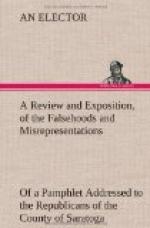But, while I cannot admit that England is an Achilles, save, perhaps, that she may be wounded like him in the heel, I will not admit, I will not own that Ireland, however mangled, however “the plowers have ploughed upon her back and made long furrows,” is in truth dead, is indeed a corpse. No; there is a juster analogy, and one given us by the only Englishman who was in every clime, and in every circumstance a Liberal; one who died fighting in the cause of liberty, even as in life he sang it. Byron denounced the union between England and Ireland as “the union of the shark with its prey.”
Chapter VIII
IRELAND, GERMANY AND THE NEXT WAR
In the February, 1913, Fortnightly Review, Sir Arthur Conan Doyle at the end of an article, “Great Britain and the Next War,” thus appeals to Ireland to recognize that her interests are one with those of Great Britain in the eventual defeat of the latter:
“I would venture to say one word here to my Irish fellow-countrymen of all political persuasions. If they imagine that they can stand politically or economically while Britain falls they are woefully mistaken. The British fleet is their one shield. If it be broken Ireland will go down. They may well throw themselves heartily into the common defence, for no sword can transfix England without the point reaching Ireland behind her....”
I propose to briefly show that Ireland, far from sharing the calamities that must necessarily fall on Great Britain from defeat by a great power, might conceivably thereby emerge into a position of much prosperity.
I will agree with Sir A. Conan Doyle up to this—that the defeat of Great Britain by Germany must be the cause of a momentous change to Ireland: but I differ from him in believing that that change must necessarily be disastrous to Ireland. On the contrary, I believe that the defeat of Great Britain by Germany might conceivably (save in one possible condition) result in great gain to Ireland.
The conclusion that Ireland must suffer all the disasters and eventual losses defeat would entail on Great Britain is based on what may be termed the fundamental maxim that has governed British dealings with Ireland throughout at least three centuries. That maxim may be given in the phrase, “Separation is unthinkable.” Englishmen have come to invincibly believe that no matter what they may do or what may betide them, Ireland must inseparably be theirs, linked to them as surely as Wales or Scotland, and forming an eternal and integral part of a whole whose fate is indissolubly in their hands. While Great Britain, they admit, might well live apart (and happily) from an Ireland safely “sunk under the sea” they have never conceived of an Ireland, still afloat, that could possibly exist, apart from Great Britain. Sometimes, as a sort of bogey, they hold out to Ireland the fate that would be hers if, England defeated, somebody else should “take” her. For it is a necessary corollary to the fundamental maxim already stated, that Ireland, if not owned by England, must necessarily be “owned” by someone else than her own inhabitants.




